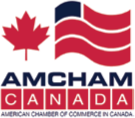Your voice for
cross-border
business

Canada should press pause on the Digital Services Tax
Jun 25, 2025

Opinion | By Rick Tachuk, President, AmCham Canada | June 25, 2025
The Financial Post
On Monday, the federal government will begin collecting an estimated $2.4 billion in revenue from its new Digital Services Tax (DST), which targets big companies — mostly U.S.-based — that earn revenue from digital activities and services they provide to Canadians. Business groups on both sides of the border have urged Ottawa to delay this first payment and give trade negotiations more time to succeed. Yet Finance Minister François-Philippe Champagne has confirmed the tax will proceed as planned.
Doing so risks worsening an already fragile Canada-U.S. relationship, and it is Canadian consumers and businesses who will ultimately pay the price.
It’s hard to understand why Ottawa would forgo flexibility at such a sensitive moment. The United States has consistently opposed digital services taxes, no matter who has been president. The Biden administration raised the DST early in trade discussions and even filed for dispute settlement under the Canada-U.S.-Mexico trade deal. In March, the new U.S. Trade Representative doubled down, listing Canada’s DST as a significant foreign trade barrier. That bipartisan message — a rarity in modern Washington — should not be ignored.
Ottawa’s first defence appears to be that the DST is “the law,” as Minister Champagne recently noted. That’s true: the tax was passed in 2023 as part of a fiscal update. But the legislation also gives the minister clear authority to delay the payment date. That discretion exists for good reason. In today’s trade climate, choosing caution over rigidity would be wise.
The DST is already controversial for being retroactive, applying to revenues earned as far back as January 2022. A short delay of 30 or 60 days, especially while both governments work toward a G7-negotiated solution, is hardly unreasonable for a tax three and a half years in the making.
Another justification from Ottawa is that the DST targets “Big Tech,” which should “pay its fair share” to operate in Canada. That’s a politically appealing narrative. But in practice, the tax applies to any company — foreign or domestic — that meets a global revenue threshold. That includes online travel platforms, food delivery services, and others operating on thinner margins.
Consider a company that helps market Canada’s amazing local tourism offerings to all corners of the world. Why would we tax that revenue at a time when we’re trying to boost international visits? And because the DST is levied on revenue — not profit — it can disproportionately affect lower-margin businesses like many of those operating in the tourism sector. The government may continue using “Big Tech” rhetoric, but the reality is that investing in Canada is about to become more expensive for a wide range of digital service providers.
Ottawa has also argued that “other countries are doing this, too.” But most jurisdictions that have a DST introduced it prospectively, not retroactively. They also moved before international tax negotiations began. Canada, by contrast, is plowing ahead now — even as the OECD continues to try to finalize a multilateral agreement. That undermines the global effort and gives other countries political cover to act unilaterally as well.
The new tax sends a worrisome message, especially from a government that has pledged to make life more affordable. Make no mistake, prices will rise for Canadian consumers and businesses. It also works against Ottawa’s stated goal of attracting investment and building the strongest economy in the G7. It’s hard to imagine any company choosing to invest in a jurisdiction that continues to introduce new taxes and other investment disincentives. In addition to all that, the U.S. is likely to retaliate with countermeasures that hurt a broader range of Canadian exports. With bilateral tensions already high due to tariffs, why make things worse?
The warning signs are clear. Fortunately, the government still has time to change course before June 30. Delaying the first DST payment wouldn’t weaken Canada’s position: it would strengthen it by preserving leverage in trade talks. Moving ahead without securing anything in return isn’t principled or strategic. It’s a missed opportunity that risks unnecessary escalation.
Rick Tachuk is president of the American Chamber of Commerce in Canada.
Published by The Financial Post - June 25, 2025
About AmCham Canada
The American Chamber of Commerce in Canada (AmCham Canada) supports policies and initiatives that promote U.S.-Canada trade, investment, and innovation. With chapters across the country and strong ties to both American and Canadian business communities, AmCham Canada serves as a critical bridge between businesses and governments, advocating for a vibrant and resilient cross-border economy.


